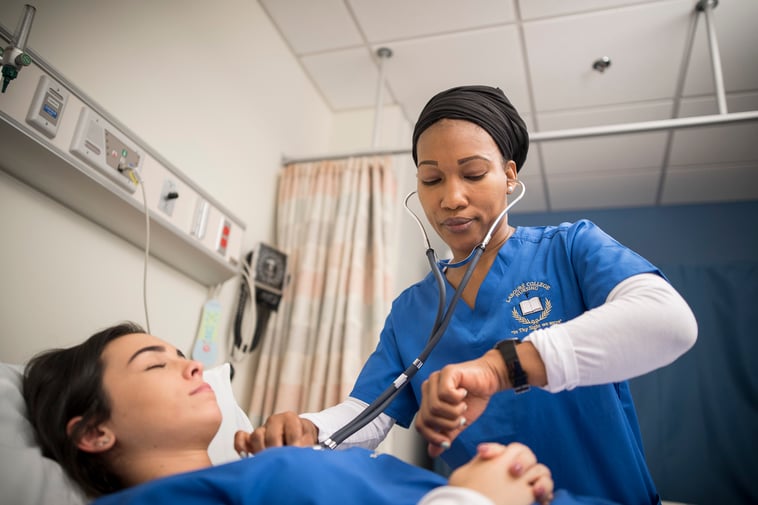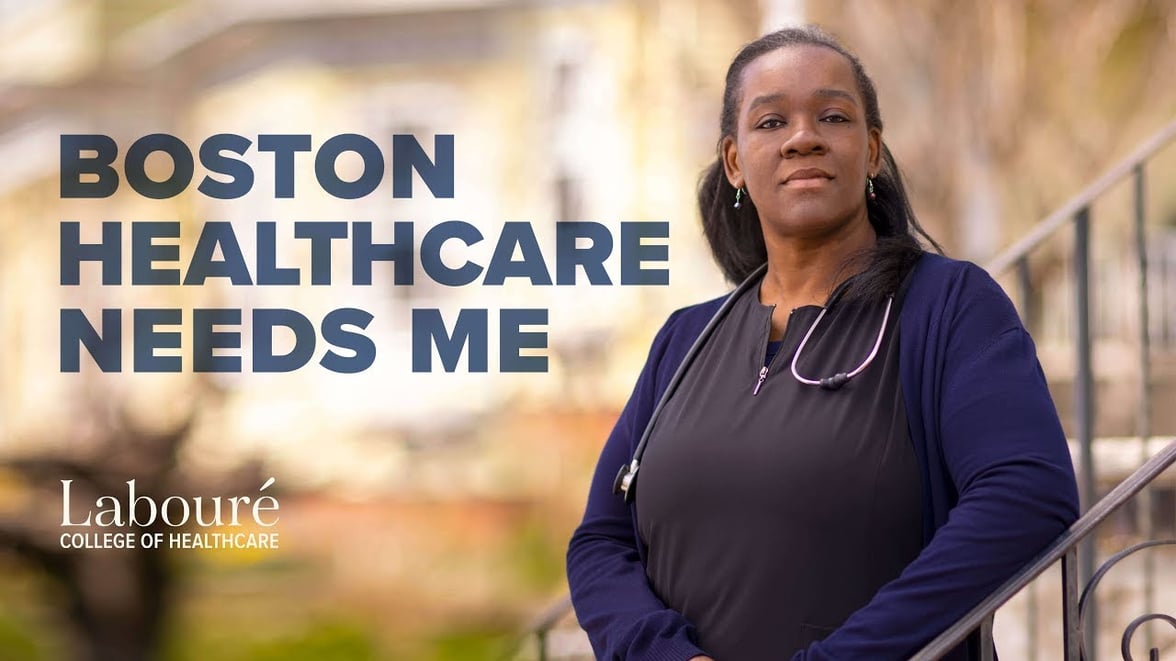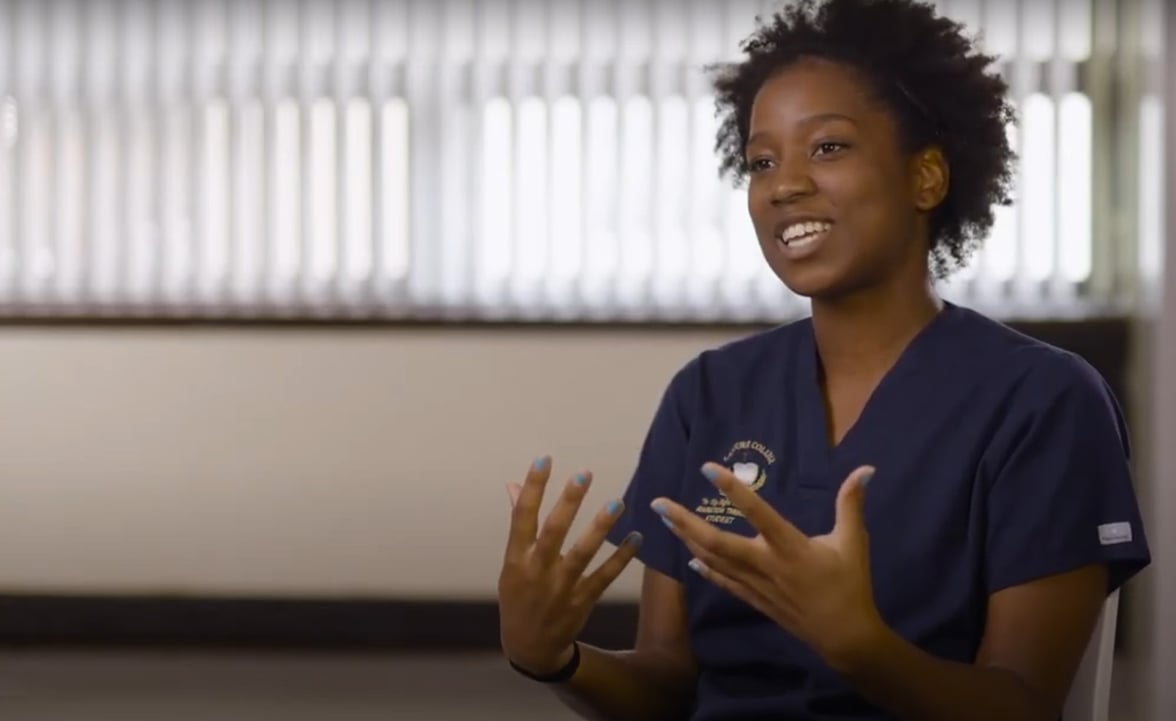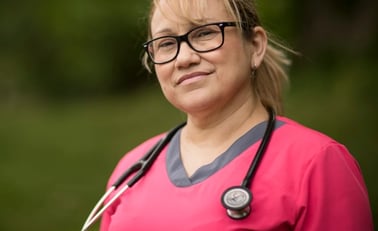Overview
Since 1892, nearly 10,000 of our nurses and healthcare professionals have gone to work caring for patients in Boston and around the globe.
Our students are local adults who are resilient, mature, and compassionate. Many have been called to a career in healthcare through personal experience, tragedy, or adversity.
Over their careers, each of these dedicated caregivers will work with tens of thousands or patients. That's hundreds of millions of lives touched by Labouré graduates.
Every day, they live out the values of our namesake, St. Catherine Labouré, by bringing dignity, compassion, and empathy to the people entrusted to their care.
Labouré College of Healthcare is a private, non-profit 501 c(3).
Our Students
Our students come from many backgrounds but share a common goal: to give patients exceptional care.
Getting help when you're ill can be scary and stressful - but a caring face can make all the difference. We know that healthcare outcomes improve when patients have nurses who speak their language, understand their culture, and look like them. Educating healthcare providers who better reflect and serve our community is at the heart of Labouré's mission.
When students graduate, they stay to deliver care here in their own communities. Their communities gain diverse providers grounded in our tradition of care and compassion, and our students' lives are transformed - not just by a fulfilling career, but by a salary that supports their families.
OUR ASN STUDENTS AT A GLANCE
35
97%
are Massachusetts residents
68%
63%
40%+
94%
50%+
are working as nurse aides
51%
31%
A diverse healthcare workforce

Student nurses learn to take vitals on each other in the first level of nursing clinical instruction. Practicing with your classmates is a low-stress learning experience that builds both technical skills and communication skills.
Our graduates mirror the patient population of Greater Boston. They live and work in our communities. Many speak multiple languages. They are motivated to provide for their families while caring for others.
We know that disparities in healthcare persist despite growing awareness of the problem. When a patient receives care from someone who looks like them and understands them, they develop trust - and care improves.
Representation in healthcare is one of the most significant ways in which to fight disparities and build equity. It is central to Labouré's primary mission: to build the modern workforce of diverse, highly skilled healthcare professionals that our world - and our community - desperately needs.
Care for your future
Apply today and take the next step toward a meaningful career in caring for others.
ALUMNI STORIES

Suki Stiles, Class of 2013, is one of six nurses featured in a video by Reebok honoring real-life wonder women by highlighting nurses working on the front lines of the COVID-19 pandemic. The Boston-based brand’s new collection - Reebok x WONDER WOMAN 84™- shines a spotlight on the healthcare professionals who have spent the last six months risking their own lives to save their patients.
ALUMNI STORIES

My class is made up of the nicest, most interesting group of people.
At Labouré, the students are from all over the world. Some of my best friends are from Africa, Haiti, and Jamaica. Working and learning with such a diverse group of classmates has been a learning experience in itself. We all have different skill sets we can use to reach our common goal of becoming RNs. The diversity allows you to look at solutions to problems from many different angles which is crucial to critical thinking, a core concept of the program.
Leading the way

Graduates celebrated pinning with family photos on campus in spring 2021.
Healthcare is constantly evolving; so is Labouré and our academic programs.
We know that Massachusetts faces a critical shortage of nurses and healthcare professionals. Labouré is uniquely qualified to meet this need.
We are the largest educator of nurses in the Boston area, dating all the way back to 1892. At the same time, we are at the leading edge of healthcare technology, preparing students for emerging careers - some which may not even exist yet.
Our faculty are nimble and well respected in their fields, and we have a successful track record of quickly creating academic programs in response to the demands of the healthcare industry.
We continue to maintain successful partnerships with workforce development organizations, major Boston hospitals, and top-tier healthcare facilities around the US. These relationships allow us to offer clinical placements that help our students build the skills that are most in demand now, and in the decades to come.
Video Reel

Nurse Impact: Labouré College

Melissa ’17, Radiation Therapy Graduate
Directory
Denise Edinger, MS, RN
Associate Chairperson and Associate Professor, Nursing
B.S., Curry College
M.S., Boston College
D.N.P. (candidate), Regis College
Jacquelyn Polito, MHA, REEGT, RPSGT, RST
Chairperson and Associate Professor, Neurodiagnostic Technology
B.A., Framingham State College
M.H.A., Simmons College
Ann Sinewick, MSN, RN
Associate Chair, ASN Program
B.S.N., Emmanuel College
M.S.N., Emmanuel College
Sharon Southwick, RRT
Program Director, Respiratory Care
A.S., Quincy College
A.S., Newbury College
B.A., Bridgewater State University
Ashley Walbert, R.EEG/EP T., CNIM
Assistant Chairperson, Neurodiagnostic Technology and Program Director, IONM
B.S., Indiana University Purdue University Indianapolis
Edward Akers
Junior Network Administrator
Rani Arsenault
Business Office Manager
Adzele Benoit
Student Success Manager
Angela Bird
Assistant Business Office Manager
Garrett Brown
Desktop Support Technician
Anne Marie Conneely
Assistant Director of Academic Advising & Student Success
Nancy Cook
Senior IT Database and Systems Administrator
Megan Currivan
Senior Executive Assistant to the President
Nikki David, DHS
Academic Advisor/Partnership Coordinator
Deputy Title IX Coordinator
Meghan Drottar, MSN, RN
Simulation Educator, Nursing
Todd Dusenbery
Grants and Foundations Director
Holly Dyer
Enrollment Services Coordinator II
Cody Garcia-Blalock, BSN, RN
Assistant Director of Academic Support
Tina Gorham
Assistant Director of Financial Aid
Erin Hanlon, RN
Director of Financial Aid
Amy Marie Johnston
Registrar
Maggie Larkin
Special Projects Manager
Alexander Lester
Director of Instructional Technology and Design
Faye Liu
Enrollment Services Coordinator
Shantill Lopes
Health Compliance Coordinator
Victoria Mansfield
Director of Clinical Education, Respiratory Care Program
Joe Marois
Academic Support Specialist
Carolyn McInnis
Manager of Recruitment and Admissions
Jonathan Millhauser
Administrative Assistant, Division of Nursing
Rebecca Palmer
Institutional Data and Planning Analyst
Wayne Peterson
Director of Information Technology
Daniella Satterfield
Human Resources Director
Helen Shedden, MS, RN
Nursing Lab Coordinator
Ian Smith
Administrative Coordinator, Student Success Center
Kristina Maria Smith-Sparks
Assistant Registrar
Carolyn Spindler
Director of Communications and College Website
Rev. John Stagnaro
Campus Minister
Associate Professor, General Education
Douglas Tepe
Information Systems Administrator and Analyst
Samantha Tolys
ADA/504 Testing Coordinator and Academic Advisor
Catherine Twombly
Financial Aid Counselor
Bridget Wahlberg
College Advancement Coordinator
Declan Walsh
Welcome Center Assistant
Anitra Williams-Nance
Clinical Placement Director, Division of Nursing
Michelle Young
Associate Controller
*Alena Adams, DNP, MSN Ed, RN
Clinical Adjunct Faculty, Nursing
A.S.N., Excelsior College
B.S.N., M.S.N., Western Governor’s University
D.N.P., Capella University
*Christine Allen, RN, BSN, CCM
Adjunct Faculty, Nursing
R.N., Brockton Hospital School of Nursing
A.S.N., Fisher College
B.S.N., Curry College
*Marat Avshalumov, PhD, ABNM, CNIM
Adjunct Faculty, Intraoperative Neuromonitoring
M.S., Daghestan State University
Ph.D., Rostov State University
*Kathy Baker, BSN, RN, MA
Clinical Adjunct Faculty, Nursing
B.S.N., Boston College
M.H.A., Framingham State University
Debra Baydoun, MSEd, FASET, REEGT/EPT, RPSGT, RNCST, RST, CNCT
Associate Professor & Clinical Site Coordinator, Neurodiagnostic Technology
B.S., University of Southern Indiana
M.S., Indiana University
Paul Bianchi, MSN, RN
Assistant Professor, Nursing
B.S.N., Curry College
M.S.N., Curry College
*Christine Blodgett, REEGT/EP T, CLTM
Adjunct Faculty, Neurodiagnostic Technology
M.A., Harvard University Extension
*Marie Bonhomme, MHCM, BSN, RN
Adjunct Faculty, Nursing
A.S.N., Masssachusetts Bay Community College
B.S.N., University of Massachusetts, Boston
M.H.C.M., Cambridge College
*Marie Borgella, DNP, RN
Adjunct Faculty, RN-BSN Program
B.S.N., University of Massachusetts Boston
M.S.N., Regis College
D.N.P., MGH Institute
*Karen Boyd, BSN, RN
Clinical Adjunct Faculty, Nursing
B.S.N., Northeastern University
*Maryan Brundige, BSN, RN
Clinical Adjunct Faculty, Nursing
B.S.N., Curry College
*Joyce Cadorette, MSN, BSN, RN
Adjunct Faculty, Nursing
B.S.N., M.S.N., University of Massachusetts
*Daniel Chipman
Adjunct Faculty, Respiratory Care
A.A.S., Newbury College
B.S., Bridgewater State University
*Catherine Cochrane, MSN, BSN, RN
Adjunct Faculty, Nursing
B.S.N., M.S.N., Boston College
*Stephanie Colman-Brochu, MSN, RN
Adjunct Faculty, Nursing
B.S.N., Northeastern University
M.S.N., Regis College
Christine Costa, MSN, RN
Assistant Professor, Nursing
A.S.N., Boston University
B.S., Bridgewater State University
M.S.N., Walden University
*Rebecca Costa, R.EEGT, CNIM
Adjunct Faculty, Neurodiagnostic Technology
*Paul Dionne, REEGT
Adjunct Faculty, Neurodiagnostic Technology
B.S. Northeastern University
*Victoria DiRito, BSN, RN
Clinical Adjunct Faculty, Nursing
B.S.N., Salve Regina University
Lynn Doyle, DNP, CPNP
Associate Professor and Course Coordinator, Nursing
B.S.N., Emory University
M.S.N., University of Wisconsin at Madison
D.N.P., Regis College
Meghan Drottar, MSN, RN
Simulation Educator, Nursing
B.S.N., M.S.N., Curry College
Robert Engley, PhD
Writing Coach, Arts and Sciences
B.A., Northwestern University
M.A., Ph.D., Boston University
*Pamela Evans
Adjunct Faculty, Respiratory Care
A.A.S., Massasoit Community College
B.S., Boise State University
*Lisa Feinman
Adjunct Faculty, Arts and Sciences
B.A., University of Miami
M.A, University of Houston
M.S., Western Maryland College
Kasey Flaherty, MSN, RN
Assistant Professor, Nursing
B.S.N., Curry College
M.S.N., Regis College
*Kathleen Flaherty, MSN, BSN, RN
Assistant Professor, Nursing
B.S.N., University of Massachusetts, Boston
M.S.N., Framingham State University
JoAnne Foley, DNP, RN
Professor, Nursing and Course Coordinator
B.S., M.S., University of Massachusetts, Boston
D.N.P., Walden University
*Clare C. Gale, BS, CNIM, REEG/EPT, FASNM/ASET
Adjunct Faculty, Intraoperative Neuromonitoring
B.S., A.S., Franklin University
*Lindsey Gaudette
Adjunct Faculty, CNA Program
*Cynthia Gilbert, MSN, RN
Professional Tutor, Nursing
M.S.N., B.S.N, Boston University
*Bryan Gleason, BSN, RN
Adjunct Faculty, Nursing
B.S.N., Salem State University
*Pamela Guilbault, BSN, RN
Clinical Adjunct Faculty, Nursing
B.A., University of Massachusetts, Boston
B.S.N., Curry College
Catherine Harris, MSN, RN
Assistant Professor, Nursing
B.S.N., Emmanuel College
M.S.N., Anna Maria College
Nichole Heering, MSN, RN
Assistant Professor, Nursing
B.S.N., University of Massachusetts, Amherst
M.S.N., Curry College
Penelope Hennessy, MS, RN
Associate Professor, Nursing
B.S.N., Worcester State College
M.S., Boston College
*Faisal Jahangiri, MD, CNIM, DABNM, FASNM
Adjunct Faculty, Intraoperative Neuromonitoring
Khyber Medical College, University of Peshawar
*William Kasper, BSN, RN
Clinical Adjunct Faculty, Nursing
A.S.N., Labouré College (now Labouré College of Healthcare)
B.S.N., Sacred Heart University
*Elizabeth Kelly, BSN, RN
Clinical Adjunct Faculty, Nursing
B.S.N., University of Massachusetts, Boston
Daniel Kleber
Associate Professor, Arts and Sciences
B.A., San Diego State University
M.A., St. Mary’s College
James Corey Latta, PhD
Assistant Professor, Arts and Health Sciences
M.A., Concordia University
Ph.D., The University of Southern Mississippi
*Alexander Lester, MEd
Director of Instructional Technology and Design
B.A. Misericordia University
M. Ed., Bowling Green State University
Gregory Madancy, MSN, RN
Associate Professor, Nursing
B.S.N., Salve Regina University
M.S.N., Walden University
*Dianne Mahoney, MSN, RN
Clinical Adjunct Faculty, Nursing
B.S.N., Northeastern University
M.S.N., Boston University
*Melissa Maldonado
Adjunct, Arts and Health Sciences
B.A., Marymount Manhattan College
M.A., Liberty University
*Adams Marks, MEd
Adjunct Faculty, Arts and Health Sciences
B.S., Boston University
M.Ed., American College of Education
*Renee Marshall, MSHM, JLS (ASCP)
Adjunct Faculty, Arts and Health Sciences
B.S., M.S., University of Massachusetts, Dartmouth
M.S., Southern New Hampshire University
Virginia Mason, PhD, RN
Associate Professor, Nursing
B.S.N., Boston College
C.N.S., Yale University
Ph.D., University of Massachusetts, Worcester
Maureen McDonald, MSN, RN
Lecturer, Nursing
B.S.N., Curry College
M.S.N., University of Massachusetts, Boston
Nancy McDonald, MSN, RN
Assistant Professor, Nursing
B.S., Emmanuel College
M.S.N., Framingham State College
*Gabor Menyhart
Adjunct, RT
M.S., Technical University of Budapest
M.S., University of Kentucky
*Liam Meyer, PhD
Writing Coach, Arts and Sciences
B.A., Hamilton College
M.A., Boston University
Ph.D., Boston University
*Lauren Miller, MSN, BSN, RN
Clinical Adjunct Faculty, Nursing
A.S.N., Labouré College (now Labouré College of Healthcare)
M.S.N., B.S.N., Western Governors University
*Susan Morse, BSN, RN
Clinical Adjunct Faculty, Nursing
B.S.N., Labouré College (now Labouré College of Healthcare)
*Denmark Mugutso, MS, CNIM
Adjunct Faculty, Intraoperative Neuromonitoring
B.S., University of Zimbabwe
M.S., St. Joseph University
M.S., Atlanta Institute of Clinical Neuroscience
*Caitlin Murphy, BSN, RN
Clinical Adjunct Faculty, Nursing
B.S.N., Chamberlain University
M.S.N. (candidate), Chamberlain University
Susan Murphy, MSN, RN
Assistant Professor, Nursing
B.S.N., Curry College
M.S.N., Framingham State University
Karen Murray, MS, RN
Assistant Professor, Nursing
B.S.N., Northeastern University
M.S., University of Massachusetts, Lowell
*Ellen Nadeau, MSN, RN
Clinical Adjunct Faculty, Nursing
B.S.N., Salve Regina University
M.S.N., Framingham State University
*Kerri Noonan, BSN, RN
Clinical Adjunct Faculty, Nursing
A.S., Newbury College
B.S., B.S.N., Northeastern University
*Julie Norton, MSN, RN, WCC
Adjunct Faculty, Nursing
A.S., Bay State College
B.S.N., University of Massachusetts, Boston
M.S.N., Framingham State College
*Ifeoma Obgonna, DNP, RN
Adjunct Faculty, RN-BSN Program
B.S.N., Rutgers University
D.N.P., University of South Alabama
Jacquelyn Polito, MHA, REEGT, RPSGT, RST
Associate Professor, Neurodiagnostic Technology
B.A., Framingham State College
M.H.A., Simmons College
Barbara Reuss, MSN, RN
Assistant Professor, Nursing
B.S.N., Colorado Tech. University
M.S.N., University of Phoenix
*Katie Ruggieri, PhD
Adjunct Faculty, Arts and Health Sciences
B.S., Smith College
Ph.D., University of Iowa
Coreen Salmon, MSN, RN
Assistant Professor, Nursing
A.S., Bunker Hill Community College
B.A., University of Massachusetts, Boston
B.S.N., University of Massachusetts, Boston
M.S.N., Walden University
Helen Shedden, MS, RN
Nursing Lab Coordinator
B.S., Salem State College
M.S., Boston College
*Natasha Simon-Mulrain, MSN, BSN, RN
Clinical Adjunct Faculty, Nursing
A.S.N., Labouré Caritas College (now Labouré College of Healthcare)
B.S.N., Curry College
M.S.N., Walden University
*Cory Tyler, REEGT
Adjunct Faculty, Neurodiagnostic Technology
B.S., University of Connecticut
Laureen Wagner, MS, RN
Assistant Professor, Nursing
B.S.N., Boston College
M.S.N., Framingham State University
*Carla Whitmore, MSN, RN
Clinical Adjunct Faculty, Nursing
B.S.N., Emmanuel College
M.S.N., University of Massachusetts Dartmouth
*Barbara Williams, MSN, RN
Clinical Adjunct Faculty, Nursing
B.A., University of Cincinnati
M.S.N., University of Florida
*John Willins, PhD, DABMP
Senior Lecturer, Radiation Therapy
B.S. Louisiana State University
Ph.D., University of New York at Stoney Brook
*Denotes adjunct
Location & Directions
The main offices of the College are located in what we call the Mansion building. This building, built in the 1800s, was once the private residence of the Wigglesworth family of Milton. Come take a tour!
The campus is situated between East Milton Square and Dorchester’s Lower Mills (an approximate 3 minute drive from either direction). Free parking is available on campus.
We are located at:
Labouré College of Healthcare
303 Adams Street
Milton, MA 02186
Directions
Take Rt-128 S toward I-95/US-1/Boston
Merge onto I-93 S via EXIT 37A toward Boston.
Take the Squantum St. exit, EXIT 10, toward Milton
Turn slight right onto Squantum St.
Turn right onto Adams St.
303 Adams St. is on the left
Take 1-93 N/US-1 North
Take EXIT 9 toward Adams St./Milton/N. Quincy
Turn slight right onto Willard St.
Stay straight to go onto Granite Ave.
Keep left at the fork to continue on Granite Ave.
Turn right onto Adams St.
303 Adams St. is on the left
Public Transportation
Labouré can be reached by taking the Ashmont-Mattapan trolley line from either the Ashmont or Mattapan MBTA station. Take the trolley to Milton station and walk (approximately 15 minutes) up Adams Street to the campus.
You can use the MBTA trip planner to find the best route.
Contact Us
Admissions: 617-315-1654
Main: 617-322-3500
Labouré College of Healthcare 303 Adams Street Milton, MA 02186

